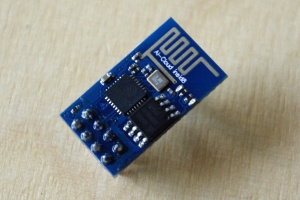Difference between revisions of "ESP8266"
(some info on ESP E-12 module) |
(→Modules: E-01 image and link to E-01 USB flashing tool) |
||
| Line 6: | Line 6: | ||
=== E-01 === | === E-01 === | ||
| + | [[File:ESP8266 E-01 (top).jpg|thumbnail|right|E-01 Module with the ESP8266 chip on board.]] | ||
| + | The E-01 module is of the cheapest and simplest modules with only 8 pins broken out to a 2x4 pin header. | ||
| + | Since this module is not very breadboard friendly with the 8x2 pin header, we have a special [[E-01 USB flashing tool]] at the '''commons'''|lab. | ||
=== E-12 === | === E-12 === | ||
| − | This module is FCC-licensed and has more pins of the [[EAP8266]] broken out. The | + | This module is FCC-licensed and has more pins of the [[EAP8266]] broken out. |
| + | The spacing if the pins is '''not''' the usual DIP/breadboard spacing of 0.1 inch. | ||
== USB-Enabled boards == | == USB-Enabled boards == | ||
Revision as of 20:16, 19 August 2016
The ESP8266 is a WiFi-enabled SOC (system on chip) which can run open-source firmware, such as nodeMCU (an eLua interpreter), Ai-Thinker (a simple TCP/IP stack to act as a serial-to-TCP WiFi adapter), a bootloader to use with the ArduinoIDE or any other program written with the SDK (software development kit).
The ESP8266 chip can be readily purchased, presoldered on a small PCB module with different pins broken out for easy access.
Modules
E-01
The E-01 module is of the cheapest and simplest modules with only 8 pins broken out to a 2x4 pin header. Since this module is not very breadboard friendly with the 8x2 pin header, we have a special E-01 USB flashing tool at the commons|lab.
E-12
This module is FCC-licensed and has more pins of the EAP8266 broken out. The spacing if the pins is not the usual DIP/breadboard spacing of 0.1 inch.
USB-Enabled boards
Amica
The NodeMCU Amica board has the E-12 module and a micro USB port on board.
